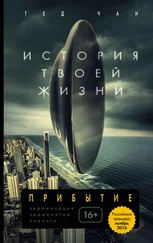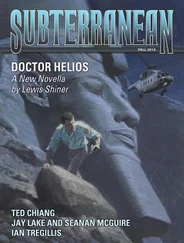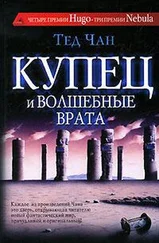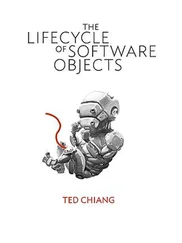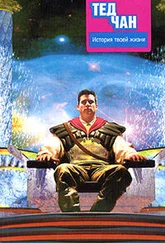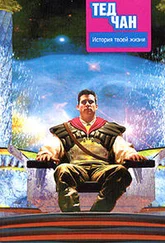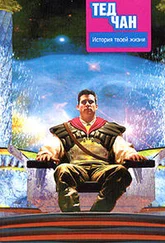“There is nothing to forgive, child. Would that I had the means to pay you as much as this message is worth to me, because a lifetime of thanks would still leave me in your debt.”
“Grief owes no debt,” she said. “Peace be upon you, my lord.”
“Peace be upon you,” I said.
She left, and I wandered the streets for hours, crying tears of release. All the while I thought on the truth of Bashaarat’s words: past and future are the same, and we cannot change either, only know them more fully. My journey to the past had changed nothing, but what I had learned had changed everything, and I understood that it could not have been otherwise. If our lives are tales that Allah tells, then we are the audience as well as the players, and it is by living these tales that we receive their lessons.
Night fell, and it was then that the city’s guardsmen found me, wandering the streets after curfew in my dusty clothes, and asked who I was. I told them my name and where I lived, and the guardsmen brought me to my neighbors to see if they knew me, but they did not recognize me, and I was taken to jail.
I told the guard captain my story, and he found it entertaining but did not credit it, for who would? Then I remembered some news from my time of grief twenty years before, and told him that Your Majesty’s grandson would be born an albino. Some days later, word of the infant’s condition reached the captain, and he brought me to the governor of the quarter. When the governor heard my story, he brought me here to the palace, and when your lord chamberlain heard my story, he in turn brought me here to the throne room, so that I might have the infinite privilege of recounting it to Your Majesty.
Now my tale has caught up to my life, coiled as they both are, and the direction they take next is for Your Majesty to decide. I know many things that will happen here in Baghdad over the next twenty years, but nothing about what awaits me now. I have no money for the journey back to Cairo and the Gate of Years there, yet I count myself fortunate beyond measure, for I was given the opportunity to revisit my past mistakes, and I have learned what remedies Allah allows. I would be honored to relate everything I know of the future, if Your Majesty sees fit to ask, but for myself, the most precious knowledge I possess is this:
Nothing erases the past. There is repentance, there is atonement, and there is forgiveness. That is all, but that is enough.
Exhalation

It has long been said that air (which others call argon) is the source of life. This is not in fact the case, and I engrave these words to describe how I came to understand the true source of life and, as a corollary, the means by which life will one day end.
For most of history, the proposition that we draw life from air was so obvious that there was no need to assert it. Every day we consume two lungs heavy with air; every day we remove the empty ones from our chest and replace them with full ones. If a person is careless and lets his air level run too low, he feels the heaviness of his limbs and the growing need for replenishment. It is exceedingly rare that a person is unable to get at least one replacement lung before his installed pair runs empty; on those unfortunate occasions where this has happened—when a person is trapped and unable to move, with no one nearby to assist him—he dies within seconds of his air running out.
But in the normal course of life, our need for air is far from our thoughts, and indeed many would say that satisfying that need is the least important part of going to the filling stations. For the filling stations are the primary venue for social conversation, the places from which we draw emotional sustenance as well as physical. We all keep spare sets of full lungs in our homes, but when one is alone, the act of opening one’s chest and replacing one’s lungs can seem little better than a chore. In the company of others, however, it becomes a communal activity, a shared pleasure.
If one is exceedingly busy, or feeling unsociable, one might simply pick up a pair of full lungs, install them, and leave one’s emptied lungs on the other side of the room. If one has a few minutes to spare, it’s simple courtesy to connect the empty lungs to an air dispenser and refill them for the next person. But by far the most common practice is to linger and enjoy the company of others, to discuss the news of the day with friends or acquaintances and, in passing, offer newly filled lungs to one’s interlocutor. While this perhaps does not constitute air sharing in the strictest sense, there is camaraderie derived from the awareness that all our air comes from the same source, for the dispensers are but the exposed terminals of pipes extending from the reservoir of air deep underground, the great lung of the world, the source of all our nourishment.
Many lungs are returned to the same filling station the next day, but just as many circulate to other stations when people visit neighboring districts; the lungs are all identical in appearance, smooth cylinders of aluminum, so one cannot tell whether a given lung has always stayed close to home or whether it has traveled long distances. And just as lungs are passed between persons and districts, so are news and gossip. In this way one can receive news from remote districts, even those at the very edge of the world, without needing to leave home, although I myself enjoy traveling. I have journeyed all the way to the edge of the world, and seen the solid chromium wall that extends from the ground up into the infinite sky.
It was at one of the filling stations that I first heard the rumors that prompted my investigation and led to my eventual enlightenment. It began innocently enough, with a remark from our district’s public crier. At noon of the first day of every year, it is traditional for the crier to recite a passage of verse, an ode composed long ago for this annual celebration, which takes exactly one hour to deliver. The crier mentioned that on his most recent performance, the turret clock struck the hour before he had finished, something that had never happened before. Another person remarked that this was a coincidence, because he had just returned from a nearby district where the public crier had complained of the same incongruity.
No one gave the matter much thought beyond the simple acknowledgment that seemed warranted. It was only some days later, when there arrived word of a similar deviation between the crier and the clock of a third district, that the suggestion was made that these discrepancies might be evidence of a defect in the mechanism common to all the turret clocks, albeit a curious one to cause the clocks to run faster rather than slower. Horologists investigated the turret clocks in question, but on inspection they could discern no imperfection. In fact, when compared against the timepieces normally employed for such calibration purposes, the turret clocks were all found to have resumed keeping perfect time.
I myself found the question somewhat intriguing, but I was too focused on my own studies to devote much thought to other matters. I was and am a student of anatomy, and to provide context for my subsequent actions, I now offer a brief account of my relationship with the field.
Death is uncommon, fortunately, because we are durable, and fatal mishaps are rare, but it makes difficult the study of anatomy, especially since many of the accidents serious enough to cause death leave the deceased’s remains too damaged for study. If lungs are ruptured when full, the explosive force can tear a body asunder, ripping the titanium as easily as if it were tin. In the past, anatomists focused their attention on the limbs, which were the most likely to survive intact. During the very first anatomy lecture I attended a century ago, the lecturer showed us a severed arm, the casing removed to reveal the dense column of rods and pistons within. I can vividly recall the way, after he had connected its arterial hoses to a wall-mounted lung he kept in the laboratory, he was able to manipulate the actuating rods that protruded from the arm’s ragged base, and in response the hand would open and close fitfully.
Читать дальше



